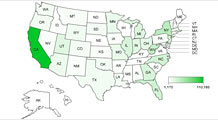Stopping stimulus waste
The government's massive plan to juice the economy is ripe for fraud, waste and corruption. See what's being done to keep it in check.
NEW YORK (CNNMoney.com) -- So they've done it. Lawmakers passed a nearly $800 billion stimulus plan - roughly the equivalent of an entire year's of discretionary government spending - in just over a month.
Now who's going to make sure all that money isn't wasted?
When signing the bill Tuesday, President Obama made big promises.
"It's a plan that will be implemented with an unprecedented level of transparency and accountability," Obama told a crowd in Denver. "With a recovery package of this size comes a responsibility to assure every taxpayer that we are being careful with the money they worked so hard to earn."
It's hard to say just how effective the oversight provisions in the stimulus will be, since the money has yet to be distributed. The oversight mechanisms have already drawn some partisan fire. While nearly everyone acknowledges there will be some waste, others are maintaining a cautious if skeptical approach as they wait to see how the spending unfolds.
Online: Perhaps the most novel idea put forth by the White House is a Web site that's supposed to show where all the money is being spent.
The White House, again leveraging an online savvy that helped get them elected, created http://www.recovery.gov/ - a site where anyone can go and supposedly see exactly who is getting what.
The site currently contains an overview of the stimulus plan, a chart breaking down where the money is going in broad terms and a handy timeline tracking stimulus milestones and alerting users to upcoming announcements, among other things.
The site promises that "within days after the signing of the legislation, Federal agencies will start distributing funds and you will be able to see which states, Congressional districts, and even Federal contractors are receiving them. As soon as we are able to, we'll display that information visually, through maps, charts and graphics."
It goes on to say that "You'll be able to send in comments, thoughts, ideas, questions and any responses you have to what you find."
Just how detailed the site will be is still unclear. It seems likely that you'll be able to bore down to specific projects in your neighborhood, but the White House did not return calls seeking comment.
More money for oversight: The stimulus plan also increases the budget for the Office of Inspector General in the various federal departments responsible for distributing stimulus money.
Each department has an Office of Inspector General charged with investigating and auditing various federal programs.
The bill allocates an additional $253 million for these offices to do their work, according to a spokesperson for Sen. Claire McCaskill, D-Mo., who fought to secure the increased funding.
Oversight board: The administration is also creating a special board to oversee stimulus spending.
The board is supposed to be headed by the Deputy Director for Management of the Office of Management and Budget and include various Inspector Generals, although no appointments have been announced yet.
It is slated to get $84 million in funding, has the power to subpoena and is charged with issuing periodic reports on the stimulus spending.
Projects would presumably be canceled or criminal charges pursued if the board uncovered wrongdoing.
Whistle-blower protections: The bill also extends protection for private workers who report fraud or corruption to authorities.
Current law gives protections - which basically attempt to ensure the whistle-blower doesn't lose their job - to federal employees and certain private employees, like those in the defense sector.
The bill expands those protections to any worker at a company receiving stimulus money.
Government audits: In addition to audits by the federal departments, the Government Accountability Office - which audits federal programs for abuse and fraud - is charged with various oversight tasks in the stimulus bill.
A spokesman for the GAO couldn't say exactly what those tasks are or how many they are expected to perform, as the agency is still reviewing the bill.
Republicans in Congress, who generally wanted a much smaller stimulus package (if any at all), criticized the oversight provisions for giving too much power to the president.
Mike Steel, a spokesman for House Minority Leader John Boehner, R-Ohio, called the Web site "a great way of displaying whatever information is put into it."
Steel said Congress had very little oversight capacity now that the bill has become law.
"We can't rely solely on the administration to self-police," he said.
But others dismissed the idea that Congress would actually do anything even if it was given the tools for the job.
"Generally, Congress had no record of ever actually doing anything with the oversight reports they get," said Brian Riedl, a federal budget analyst at the conservative Heritage Foundation.
Riedl said they'll likely be lots of waste in the bill and recommended making all contract awards subject to competitive bidding.
Audits, he said, were ineffective because they are done after the fact.
But others said audits are an effective tool for deterring waste.
"The knowledge that somebody could be checking will increase accountability," said Maya MacGuineas, president of the Committee for a Responsible Federal Budget, a non-partisan watchdog group.
MacGuineas said there's bound to be waste, but also acknowledged the difficult balancing act between passing a robust bill with lots of oversight protections and passing a bill quickly - a requirement most economists say is essential if stimulus is to actually help the economy.
"We're striving for as good as we can get," she said. ![]()



